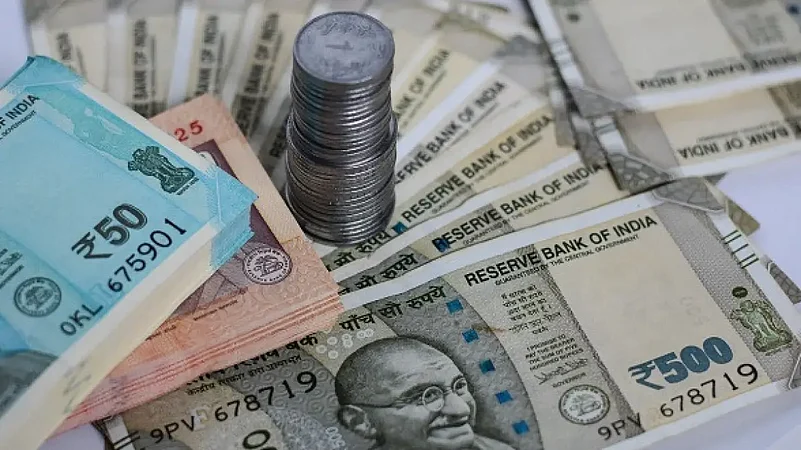Amid concerns over the decline in the value of the rupee against the US dollar, Finance Minister Nirmala Sitharaman on Tuesday asserted there is no collapse of the unit and it is actually finding its natural course.
Sitharaman informed Rajya Sabha that the RBI is continuously monitoring the local currency and intervening only if there is volatility.
"The RBI interventions are not so much to fix the value of the Indian Rupee because it is free to find its own course," the minister told the Rajya Sabha during Question Hour.
Replying to supplementaries, she said interventions that are happening from the RBI side are more for containing volatility that is happening between the Indian rupee and the US dollar and so on.
"Even the interventions being made by RBI are not so much to determine the value - increase or decrease, of the Indian rupee. It is not for that. It is more to avoid the volatility and allow it to find its course. India, like many other countries, is not pitching its currency at a level extraneously. So the ways and which we want to strengthen... the RBI and the Ministry are fairly engaged in it," she said as members expressed concerns over the decline in the value of the Indian currency.
On suggestions that non-resident Indians should be allowed to make remittances in foreign currency, she said it is not an assurance that the Ministry of Finance will give but she can only pass on the suggestion to the RBI.
Sitharaman said the rupee has seen more fluctuations against the US dollar but its performance is better than its peers. "We have withstood the impact of the US Fed's decisions much better than any other peer currencies," she told the house.
Actually, if you compare the Indian rupee versus other currencies, it is appreciating its value, she said, urging the members to understand the context and speak about the Indian rupee.
"I would like to assure the member that there is no collapse of the Indian Rupee," she asserted.
On the reserves coming down, she said, "We are still somewhere in the range of $500 (billion).
As of July 22, it was at $571.56 billion in reserves, she said, adding that it was not a small amount and India is still comfortably placed. "So, I want the house to take into cognizance the Indian rupee's performance versus others, whether it is the UK Pound and so on, and contextualize the performance of Indian rupee versus the US, particularly because of the steps that are being taken by the US Fed," she told the Rajya Sabha.
"There is no collapse. It is actually finding its natural course. The RBI is continuously monitoring it and intervening only if there is volatility. RBI interventions are not so much to fix the value of the Indian rupee because it is free to find its own course," Sitharaman said.
Earlier, TMC member Luizinho Faleiro claimed in the last six months, the rupee depreciated 28 times by 34 per cent and foreign reserves declined to USD 572 billion by mid-July.
Recalling the remarks of Narendra Modi when he was chief minister of Gujarat, Pramod Tiwari of the Congress asked when the value of the rupee will increase.
The finance minister replied that when the then Gujarat CM and now Prime Minister had made comments on the Indian currency, the economy was in serious shape on all other parameters.
"The reason for his comments then was that India had double-digit inflation for 22 months in a row. India had become a fragile economy. Today there is a recovery from the pandemic, the second wave, the Ukraine war India's currency is still strong, please keep it in mind in Amrit Kaal," she said.
Earlier, Minister of State for Finance Pankaj Chaudhary said the government is making efforts on the declining value of the Indian rupee.
During the UPA from 2004-2014, he said the value of the rupee in a year was down 10-12 per cent, whereas during the NDA government in the last eight years since 2014, the decline in the rupee is much less. He said that the US Dollar value has increased by 4.54 per cent.
In her written reply to the starred question, Sitharaman said the exchange rate of the Indian rupee is determined largely by the market forces of demand and supply.
"The Reserve Bank of India (RBI) intervenes only to curb excessive volatility in the foreign exchange market and to maintain orderly conditions therein without targeting any specific level of the exchange rate.
"RBI regularly monitors the foreign exchange market and intervenes in situations of excess volatility," the minister said.
"The Government and the RBI closely monitor developments in the exchange rate of the Indian rupee and calibrate macroeconomic policies on a regular basis," Sitharaman also said.


























.jpg?w=200&auto=format%2Ccompress&fit=max)




